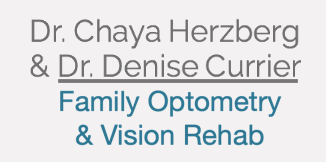Frequently Asked Questions
-
Q: When should my child first visit an eye doctor?
A: Until recently parents were told that children did not require an eye exam until they were ready to start school but now we know this is much too late. Recent research on infants has shown that many parts of the visual system mature to adult levels by the age of six months. We examine babies and young children as well as non-verbal older children.
-
Q: What is a Pediatric Optometrist?
A: Pediatric Optometry is a specialty focused on children’s vision and the effect of vision on learning and child development. A Pediatric Optometrist has special training, a residency in this specialty and fellowship credentials.
-
Q: What does a pediatric eye exam include?
A: A pediatric eye exam evaluates:
- Visual acuity or sharpness of sight
- Refractive error or need for glasses
- Eye teaming and depth perception
- Learning and development
- Ocular and general health
-
Q: What are the signs and symptoms of a vision problem?
A: Symptoms vary with age and development and are more likely when there is a family history of vision problems.
-
Q: Are vision problems treatable?
A: Absolutely! Treatments include eyeglasses and vision therapy. Depending on a child’s diagnosis, vision therapy can be home or office based.
-
Q: Is it too late to treat my child’s lazy eye (amblyopia)?
A: Never! It is rare that visual function cannot be improved for a person at any age. There was a case of an elderly man who developed a cataract in his ‘good’ eye. As it became denser, the vision in his ‘lazy’ eye improved significantly.
-
Q: How do I know if my child is dyslexic?
A: A team of specialists is typically involved in making the diagnosis of dyslexia. Some reading problems are more visually based than others. Dyslexia responds to many kinds of intervention as well as specialized reading programs.
-
Q: Do you take insurance?
A: No. We are not a participating provider for any insurance company but will provide the necessary codes for reimbursement from your insurance company. Many insurance companies now reimburse for vision therapy.
-
Q: Your fees?
A: Our fees are available upon request, and we will provide care on a sliding scale if finances are an issue. Please inform the doctor. No child is refused care for financial reasons.
